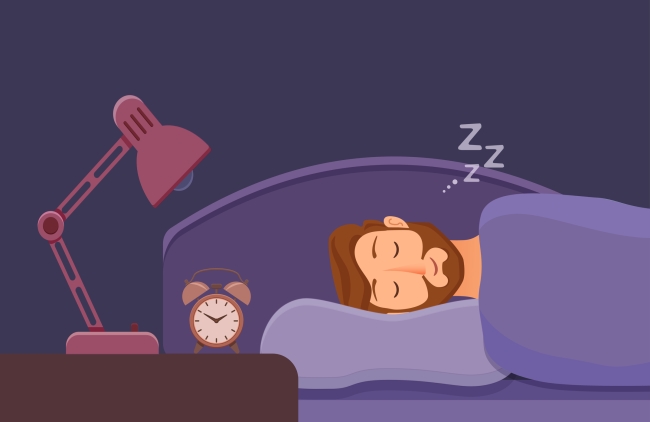You have /5 articles left.
Sign up for a free account or log in.

GlinskajaOlga/iStock/Getty Images Plus
The National Sleep Foundation, a nonprofit with support from pharma and the medical device industry, has since 1991 annually surveyed Americans on the quality, quantity and impact of their sleep. Their 2023 Sleep in America poll showed that fewer than 10 percent of us report doing 10 common-sense things that help one sleep well—things like having consistent sleeping hours and mealtimes, avoiding bright light and electronic devices before bedtime, having a restful sleep environment, and getting exercise during the day. The sleep habits of 33 percent of the surveyed population received an F grade, with the respondents doing few or none of these things. Are you one of them?
According to a 2015 review in the International Journal of Higher Education, while graduate students have better sleep patterns than undergrads, the graduate population’s sleep habits cannot be described as good. The benefits of being a little older and more proficient at managing time help graduate students do better, but the demands of coursework, research, working and volunteering, along with maturing personal relationships, all add time pressures that can affect how much sleep and relaxation a graduate student gets.
Grad students have a lot going on. Graduate education can be exhausting, and many of the studious activities that wipe people out—studying for course exams, preparing for qualifying exams, embracing a field’s literature, preparing for committee meetings—feel transient. Graduate students who teach have additional burdens that can themselves be enormous. Add in a full helping of the common annoyances of life—pollen, music played with a volume you don’t control, the breathless repetitive nothingness of all-day news, your friend who texts in bursts of no fewer than 30 messages, to cite only a few—and anyone could find themselves at wit’s end.
Good, Better, Best, Never Let It Rest
Many great thinkers have believed that sleep is something to be avoided. Some families have a gene that makes them short sleepers, able to thrive on fewer than the seven to nine hours of sleep recommended for most of us. But far more creative people have tried to be short sleepers through force of will. Most of us are not born to work around the clock, but that does not keep some of us from trying. I headed off to college believing, with Thomas Edison, that sleeping was a waste of time and that a strong-willed person could avoid it.
After a nasty breakup during graduate school, I established a three-phased system: doing most of my benchwork very late at night, sleeping for three hours, then doing most of my reading in the late morning and afternoon, followed by another three hours of sleep. I was not in the mood to invest in a new relationship, and I had many other interests that filled the edges of my double day.
Working as part of the night crew suited my introverted personality, and reading in the middle of the day suited my capacity to focus. This arrangement allowed me to read much more than most people, which improved my thinking. The sleep, concentration and creativity elements seemed optimal. I wondered why more people didn’t naturally fall into the same pattern. Years later, I understood I was running on drive and energy, not lucky genetics or healthy physiology.
Most people are graduate or professional students during their 20s and early 30s, a period of life full of learning, new responsibilities, first-time challenges and transcendent joys no matter what your day job is. It is not surprising that even those who try to live a healthy life during their training often sacrifice sleep to make room for all that needs doing.
The Swiss Army Knife of Health
Neuroscientist and sleep expert Matthew Walter has described sleep as the Swiss army knife of health. “When sleep is deficient,” he wrote, “there is sickness and disease. And when sleep is abundant, there is vitality and health.” Not sleeping enough is associated with diabetes and obesity, high blood pressure, depression, and more. Better sleep helps resolve those problems, helping especially with stress. Sleep and immunity are linked, as are sleep and tissue repair. We undo some of the damage of the day when we slumber; sleep refreshes and renews us.
Still, as long as grad students and people who work in academe are as busy as we all are, sleep will often be sacrificed. What can we do about it?
We should perhaps turn for advice to Winnie the Pooh, whose advanced philosophizing chops did not require him to earn a Ph.D. He recommended beginning by taking a smallish nap or two. Sleeping even only for a short while can increase your alertness and task performance. It helps prevent accidents associated with fatigue and drowsiness. It can relieve stress and clear your mind, helping you change gears and decompress as you move between your most intense activities and those that are less demanding. It can help you form memories and solve problems.
A look at the literature suggests the perfect napping-and-creativity experiment has not yet been done, but experts studying South Korean construction workers have found that in comparisons of napping versus lunch, lunch stimulates creativity more reliably, depending on the meal eaten. More research, obviously, must be done, for example on the benefits of postprandial napping or of postnap dining.
There are many napping studies done for various reasons. Napping among athletes is a popular topic, as is napping among people who cannot sleep enough at night. The gist seems to be that napping is good and more napping is better, up to a certain point. Naps of more than 90 minutes can disrupt your nightly sleep. Sleep inertia, the name for that feeling when a nap leaves you groggy, can happen, but sleep inertia seems to clear up within half an hour. To me, that seems worth the risk, but your experience may tell you otherwise.




